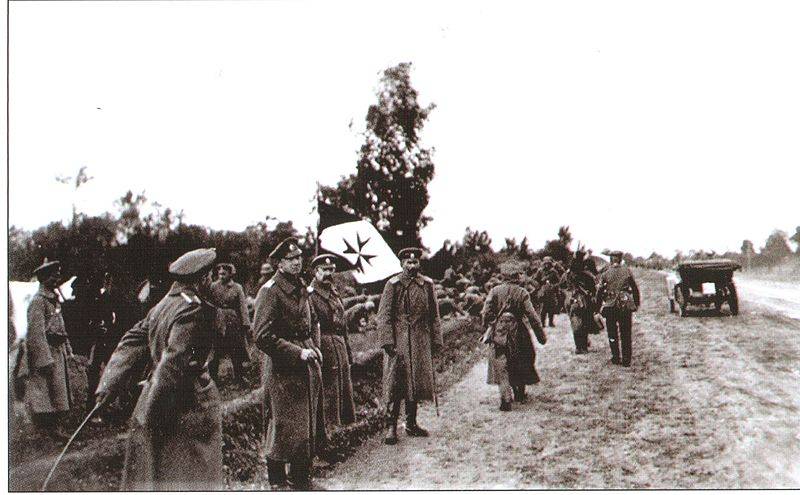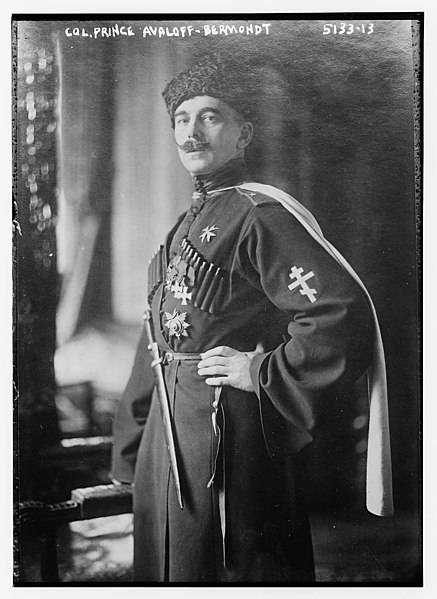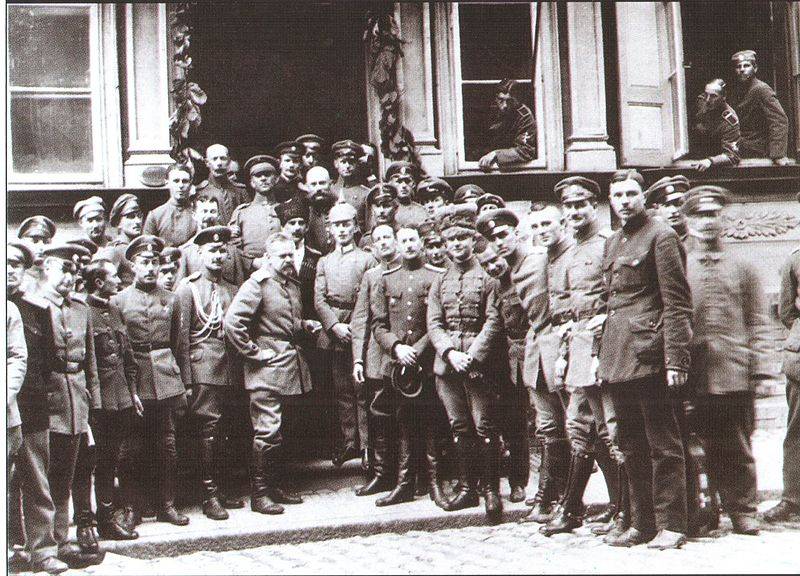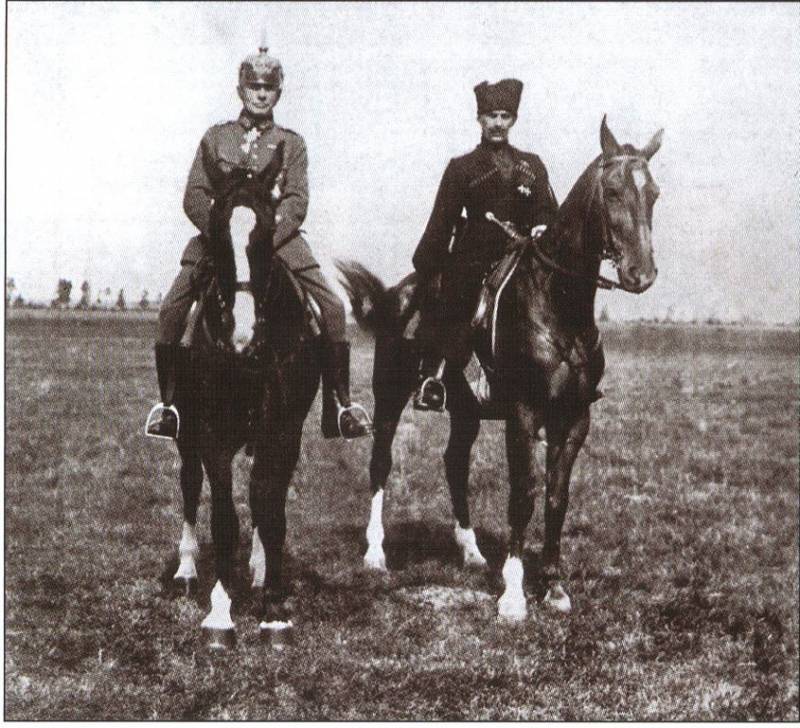Avalov Army Campaign in Riga

Adventurer Bermondt-Avalov
A single anti-Soviet Northwest Front did not exist. In the Baltic region, the interests of the great powers — Germany and England (the Entente), opposed the Baltic Limitrophs — Finland, Estonia, Latvia and Lithuania, Soviet Russia, and the White Guards, who had different orientations. So, the units of the North-West Army focused on the Entente, and the Western Volunteer Army of Bermondt-Avalov - on Germany. In addition, monarchist sentiments prevailed in the units created with the help of the Germans.
Prince Pavel Rafailovich Bermondt-Avalov was a very interesting person. A true adventurer, who during the time of troubles was able to occupy a high post and claimed leadership in the White movement of the North-West of Russia. He acted on a grand scale and imagination. Even its origin is still unknown. Born in 1877 in Tiflis. According to one version, his father was Karaite Rafail Bermondt (Karaite - a religious creed within Judaism), according to another - belonged to the princely Georgian family Avalishvili. He was also considered the Ussuri Cossack. Bermondt-Avalov himself said that he was adopted by Prince Mikhail Avalov (the first spouse of his mother, the second spouse was Rafail Bermondt).
Bermondt (Bermond) received a musical education, began military service in 1901 as bandmaster in the Argun regiment of the Transbaikal Cossack army. Member of the war with Japan, awarded the George Crosses of the 3 and 4 degrees. In 1906, he was transferred to the Ussuri Cossack Regiment and from that time on the documents passed as the Ussuri Cossack. Then he served in the St. Petersburg Uhlansky regiment, rose to the cornet. Member of the First World War, rose to the rank of captain, was slightly wounded, noted for his courage. He noted in Petrograd his adventures in restaurants and gambling houses, was implicated in dubious matters. After the February Revolution, he was elected commander of the St. Petersburg Lancers Regiment. The interim government awarded him the rank of colonel, but Avalov was a member of an officer organization that was preparing a speech against the government.
After the October Revolution, he left for Little Russia. In the summer of 1918, Mr. Avalov was attached to the Southern Army formed with the support of the Germans. He served as the head of the counterintelligence department of the army and the head of its Kiev recruitment bureau. After the capture of Kiev by the Petliurists, the prince was captured and sentenced to be shot, but with the help of German "friends" he was able to get out of prison and evacuated with German troops.

The army of German "friends"
Germany even after the November Revolution and surrender in November 1918 tried to maintain the Baltic States in its sphere of influence. In December 1918, the Provisional Government of Latvia, headed by Ulmanis, concluded an agreement with the Germans on the formation of a militia (Landeswehr) to fight the Bolsheviks. The recruitment of fighters came from the composition of the 8-th German army in the Baltic, the Baltic Germans and volunteers from Germany, where there were many demobilized soldiers and officers left without work and income. They were promised Latvian citizenship and land in Courland. The Germans also recruited Russian volunteers from prisoners of war who were in German camps. This was how Bischoff's Iron Division and other units were formed. Weapon, ammunition and financing provided by Germany. The benefit of weapons and uniforms in the Baltic is much left from the army of the collapsed Second Reich. German forces were led by Count Rüdiger von der Goltz, who had previously led the German expeditionary force in Finland, where the Germans fought on the side of the White Finns.
The Germans helped formed several Russian troops. In January 1919, Lieven formed and led the Libava Volunteer Rifle Squad, which together with the Baltic Landeswehr units at the end of May 1919 drove the Reds out of Riga. Since that time, replenishment has regularly started from Germany and Poland, where there were previously camps for Russian prisoners and now a recruitment and dispatch system of volunteers was operating under the supervision of Senator Belgard. Leaven’s detachment reached 3,5 thousand fighters, was perfectly armed and equipped. Also, with the support of the Germans, two Russian volunteer detachments were formed — the Count Keller Detachment under the command of Avalov in Mitau and the detachment of Colonel Vyrgolich (former gendarme colonel) in Lithuania, in Shavlya (Šiauliai). Formally, the units of Avalov and Vyrgolic united in the Western Corps of the North-Western Army and were subordinate to Liven, but, in fact, they were independent.
The principles of recruitment of the Bermondt and Vyrgolic troops were very different from Leaven’s troops. Lieven took only officers and soldiers of the Russian service, and selected them by careful selection. The headquarters and rear units (they often became a haven of various kinds of rabble) were reduced to a minimum. Replenishment immediately poured into the rifle companies and sent to the front. The detachments of Bermondt-Avalov and Vyrgolic accepted everyone indiscriminately, including former German officers and soldiers. Numerous headquarters were formed, units without soldiers. Thanks to this, in the summer Avalov already had 5 thousand people, and Vyrgolic had 1,5 thousand soldiers. Then these units grew even more - to 10 and 5 thousand, respectively. Armed and supplied with all three detachments at the expense of the Germans.
In July 1919, Yudenich ordered the Western Corps to be transferred to the Narva direction. But before that, at the request of the Entente, the corps had to be cleared of Germanic and pro-Germanic elements. By order of the head of the British mission, General Gough, two battalions of Leaven’s detachment (he was absent, was seriously wounded), who were in Libau, unexpectedly, without carts and artillery, were loaded onto English transport and transported to Narva and Revel. Thus, the British wanted to clear Kurland of the Russians and weaken the position of the Germans. This British trick guarded and angered many. Especially a lot of dissatisfied were in the units of Avalov and Vyrgolic, where there were enough pro-German elements. The command demanded from the Entente guarantees of supply and allowance on the same scale as was the case with the Germans. The Allies refused to give such guarantees. Then Colonels Bermondt-Avalov and Vyrgolic refused to transfer troops to the Narva area on the pretext that the formation of their troops was not yet completed. In fact, Avalov did not want to leave Latvia in order to preserve Russian military power there. With the support of the military, human and material resources of Germany, it was planned to establish Russian power in the Baltic states and only then, having received a strategic bridgehead and rear base, would fight the Bolsheviks.
Thus, the Western Corps disintegrated. The headquarters and detachment of Leaven went to Narva, where they became the 5-th Lebanon Division of the North-West Army. Yudenich tried to reason Avalov, personally traveled to Riga, but the obstinate colonel did not even want to meet with him. Then Yudenich declared him a traitor, the detachments of Bermondt and Vyrgolic were expelled from the NWA. True, they did not particularly grieve about this. Avalov made himself a general. With the support of the Germans, the West Russian Government (ZRP) was formed, headed by the general and monarchist Biskupsky. The SRP was not recognized either by the Kolchak government or by the Entente. Avalov did not want to obey the civil government, and in early October, the functions of the West Russian government were transferred to the Council of Western Russia (Council of the Office of Western Russia), headed by Count Palen, who was with the army commander.
The Germans issued a loan in 300 million marks to the ZRP and Avalov’s army. In September 1919, General von der Goltz, under pressure from the Entente, was recalled from the Baltic States to Germany. German formations were officially abolished. However, trying to maintain military power in the Baltic states and thereby have an instrument of influence in the region, the Germans made a clever maneuver. The German military demobilized from the von der Goltz corps immediately began to enter the Bermondt-Avalov corps under the guise of volunteers. In addition, the German soldiers hoped that in this way they would be able to stay in Courland, get local citizenship and land, which the Latvian government promised them as a reward for the fight against the Bolsheviks. As a result, they were deceived, the new Baltic governments began to pursue a national chauvinistic policy under the slogan “beat the Germans”, expelling and seizing their lands.
The rate was in Mitau. The Western Volunteer Army (ZDA) occupied the territory between Latvians and Lithuanians. It was pretty calm here. The Red 15 Army, which held this direction, was in unsatisfactory condition; it was greatly weakened by the transfer of the best units to other fronts. ZDA fought a little with the Reds, conducted operations against partisans, but overall life was pretty peaceful. The Germans generously and flawlessly supplied Avalov’s army with everything necessary, weapons, ammunition, ammunition and provisions. In Courland, from the time of World War II, when the front stood for a long time near Riga, large army depots were located. Much was brought in during the German offensive on Soviet Russia. According to the Versailles Agreement, all this would go to the Entente. Therefore, von der Goltz calmly and generously shared good with the Russian comrades, so that the British and French would not get military equipment, or the Balts who had deceived his soldiers.
Thus, many thousands of Germans joined the Western Volunteer Army created in September 1919 under the command of Bermondt-Avalov. Only about 40 thousand people. There were a minority of Russians in the army — about 15 thousand people. Avalov received an entire army and well-armed: a lot of guns and machine guns, 4 armored trains, squadron. I had to reckon with this powerful force (for comparison, the Finnish army at that time numbered 60 thousand people). On September 5, Yudenich appointed Avalov as commander of the troops in Latvia and Courland. On September 20, the commander announced that, as a "representative of Russian state power", he would assume all power in the Baltic states, ignoring the fact of Latvian sovereignty. Perhaps at that time Avalov felt like a "Russian Napoleon." It was his finest hour. True, for this role did not fit, painfully loved worldly joys (wine, women). The prince received great independence, did not submit to the Entente and Yudenich, who depended on the allies. He even created his own personal government led by Palen.
Hike Avalova
On the 26 of August 1919 in Riga, a meeting was held by the British, which was attended by representatives of all anti-Soviet forces in the region: the North-West Army, the Western Russian Army, Finland, Estonia, Latvia, Lithuania and Poland. The plan was broad: a general offensive against Soviet Russia was scheduled for September 15. The ZDA was supposed to advance on Dvinsk - Velikiye Luki - Bologoe in order to intercept the Nikolaev railway, which connected Moscow with Petrograd.
However, when Yudenich’s army went to Petrograd, the former captain and Ussuri Cossack Prince Avalov also decided to launch an offensive. On October 6 on October 1919, the ZDA put forward an ultimatum demand to let it pass through the territory of Latvia to the "Bolshevik Front" and began to move from Mitava towards Dvinsk. The Latvian government refused. The first clash of Bermondtians with Latvian troops began. 7 October Avalov’s army moved to Riga. Having defeated and dispersed the Baltic units that blocked Kurland, on October 8 his troops reached Riga. Only bridges destroyed through the Western Dvina detained the Bermondans. The city was defended only by weak self-defense units. On October 10, the White Guards occupied the suburbs of Riga and Avalov proposed a truce to the Latvian government.
Avalov’s campaign in Riga caused a terrible commotion. The Baltic governments forgot about Yudenich’s campaign in Petrograd. Newspapers accused the Russians of all sins. In particular, it was reported that Bermondt’s plans to annex Latvia and Estonia to Russia are also the ideas of Yudenich, Kolchak and Denikin. Cried out for help to the British. All combat-ready Latvian and Estonian regiments were pulled to Riga, the Estonian units were withdrawn from the front, where they were supposed to support the advance of Yudenich’s SZA. The British fleet arrived, which began shelling the positions of the ZDA. The coalition was led by the head of the Allied mission, General Nissel, who had just arrived from France. When on October 10 parts of Avalov tried to resume the offensive, the enemy was already ready for defense. Stubborn fights began. All this happened during the breakthrough of the Yudenich army in Petrograd. As a result, the Estonian troops and the British, who were supposed to operate on the coastal flank, capture coastal batteries and red forts, attack the red Baltic Fleet, were diverted to Riga.
By October 16 1919, Avalov’s army, which had used up ammunition, had no reserves and had no political will to fight the Entente (German commanders refused to storm the city), stopped the attack. By November 11, parts of the ZDA were driven back from Riga and driven back to Kurland, to the border of Prussia. On this story Western volunteer army and ended. Under pressure from the Entente, German units were recalled to Germany in December. Behind them, the Russian troops of Avalov were evacuated. There they dispersed in exile. Avalov also fled to Germany, later collaborated with German Nazis. His military-political career is over. Died in the USA.


Information